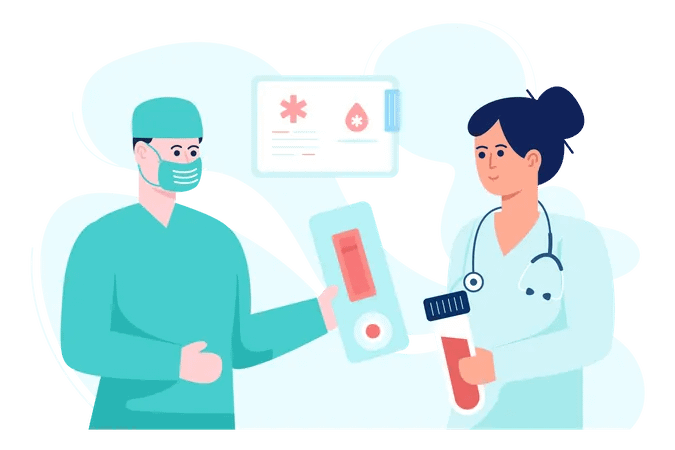Blood Sugar Levels (Glucose Test)
👉 Purpose: To detect diabetes, pre-diabetes, and monitor blood sugar control.
👉 Tests:
• Fasting Blood Sugar (FBS) – Measures sugar level after 8–12 hours of fasting
• Postprandial Blood Sugar (PPBS) – Measures sugar level 2 hours after a meal
• HbA1c (Glycated Hemoglobin) – Shows average blood sugar over the past 2–3 months
👉 Why is it important?
– Early diagnosis of diabetes
– Helps monitor sugar control in diabetics
– Prevents long-term complications (kidney, eye, nerve damage)
Cholesterol & Lipid Profile
👉 Purpose: To assess heart health and risk of cardiovascular disease.
👉 Tests:
• Total Cholesterol
• HDL (High-Density Lipoprotein – Good Cholesterol)
• LDL (Low-Density Lipoprotein – Bad Cholesterol)
• Triglycerides
👉 Why is it important?
– Identifies risk of blocked arteries (atherosclerosis)
– Assesses risk of heart attack and stroke
– Helps in guiding lifestyle changes and medication needs
Hemoglobin & Complete Blood Count (CBC)
👉 Purpose: To detect anemia, infections, and blood disorders.
👉 Tests:
• Hemoglobin (Hb) – Measures oxygen-carrying capacity of blood
• WBC Count (White Blood Cells) – Indicates infection and immunity status
• Platelet Count – Assesses blood clotting ability
👉 Why is it important?
– Detects anemia (iron deficiency or other causes)
– Indicates infections, inflammation, or blood cancers
– Helps identify bleeding or clotting disorders
Vitamin & Mineral Deficiency Tests
👉 Purpose: To diagnose causes of fatigue, weakness, and low immunity.
👉 Tests:
• Vitamin D – Crucial for bone health and immunity
• Vitamin B12 – Essential for nerve function and red blood cell production
• Iron Studies (Serum Iron, Ferritin, TIBC) – Detects iron deficiency or overload
👉 Why is it important?
– Prevents bone weakness, fatigue, and neurological problems
– Guides nutritional supplements and diet corrections
Liver Function Test (LFT)
👉 Purpose: To assess liver health and its functioning.
👉 Tests:
• SGOT (AST), SGPT (ALT) – Indicators of liver cell damage
• Bilirubin (Total, Direct, Indirect) – Detects jaundice
• Albumin & Total Protein – Evaluates liver’s ability to synthesize proteins
👉 Why is it important?
– Detects hepatitis, fatty liver, cirrhosis
– Monitors impact of alcohol or medications on the liver
– Assesses digestion and detoxification functions
Kidney Function Test (KFT / RFT)
👉 Purpose: To assess the kidney’s filtering and waste-removal ability.
👉 Tests:
• Serum Creatinine – Measures kidney filtration efficiency
• Blood Urea Nitrogen (BUN) – Evaluates waste removal function
• Electrolytes (Sodium, Potassium) – Assesses fluid and electrolyte balance
👉 Why is it important?
– Early detection of kidney disease
– Essential for monitoring in patients with diabetes or high blood pressure
– Guides treatment plans, including dialysis if required
Thyroid Profile (T3, T4, TSH)
👉 Purpose: To assess thyroid gland function.
👉 Tests:
• TSH (Thyroid Stimulating Hormone)
• Free T3 & Free T4
👉 Why is it important?
– Diagnoses hypothyroidism and hyperthyroidism
– Explains symptoms like weight changes, fatigue, hair loss, mood swings
– Helps in monitoring thyroid treatment and medication dosage
✨ Why Routine Blood Testing is Important?
✔️ Detects health problems early
✔️ Helps prevent serious diseases
✔️ Supports personalized treatment and lifestyle adjustments
✔️ Gives peace of mind about your health
📞 Book Your Blood Test Today – Take control of your health!



 योग करने के दैनिक (Daily) फायदे:
योग करने के दैनिक (Daily) फायदे: अप्रैल 2025 न्यूज़ रिपोर्ट:
अप्रैल 2025 न्यूज़ रिपोर्ट: डेली योग में शामिल करें ये आसान अभ्यास:
डेली योग में शामिल करें ये आसान अभ्यास: निष्कर्ष:
निष्कर्ष: